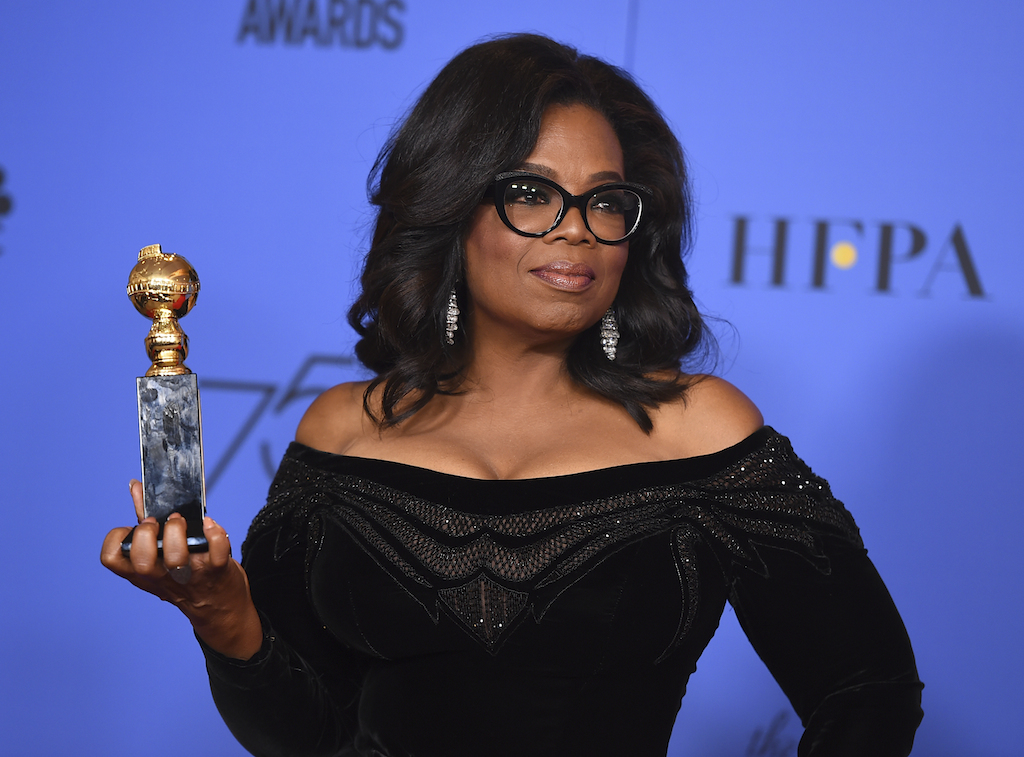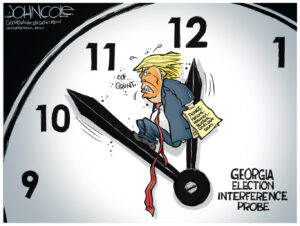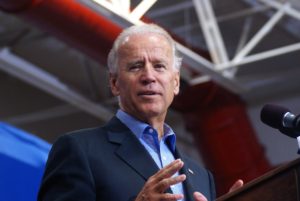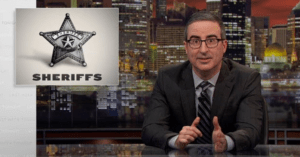What #Oprah2020 Says About the State of U.S. Politics
The American people deserve better than another television celebrity with zero political experience as their president. Oprah Winfrey at the 75th Annual Golden Globe Awards on Sunday in Beverly Hills, Calif. (Jordan Strauss / Invision / AP)
Oprah Winfrey at the 75th Annual Golden Globe Awards on Sunday in Beverly Hills, Calif. (Jordan Strauss / Invision / AP)
It says a great deal about the depths to which American politics has fallen that we are now seriously considering the presidential candidacy of Oprah Winfrey. The internationally famous television talk show star turned media mogul could easily win a global popularity contest, and in a world where Donald Trump is the president of the U.S., such accomplishment appears to be qualification enough to lead the world’s economic superpower. But should it be? Winfrey herself is not to be blamed for this absurd status quo—her brief speech at the Golden Globes was powerful, moving and necessary. The blame lies with us, with our political leaders, with our media and with the pop-culture-obsessed society we’ve created.
Winfrey possesses many of the qualities that Hillary Clinton did—her allegiance to Wall Street and her concept of neoliberal capitalism is certainly as strong as Hillary’s. Her positions on social issues also appear to be in line with Clinton’s cautious approach to racism and sexism as divorced from economic justice issues, except that unlike Clinton, Oprah has a lived experience of racism. (Like Trump, she lacks political experience—but is far more capable of learning on the job than Trump.)
On everything else Winfrey’s political positions are largely indiscernible, probably by design. In fact, the idea to draft her to run for president originated from a lifelong Republican from Kansas who says he did not vote for Trump. Bizarrely, in 1999 Trump himself touted Winfrey as his first choice for vice president if he were to ever run.
A campaign built around Winfrey would, like Clinton’s campaign, most likely center on the idea that she is not Trump. When contrasted with a deranged white supremacist who has a short attention span, doesn’t read and oozes narcissism, Winfrey offers the opposite: She is a smart, well-read (she is known for her book club, after all), woman of color who exudes empathy. However, their biggest similarities are also their greatest failings: Both are television celebrities with zero political experience, and both are billionaires (albeit coming from very different circumstances—Trump was born into money and Winfrey was not).
But the fact that #Oprah2020 is so popular says much more about us than it does about her. Have we really given up on the idea of a political candidate who is both politically experienced and can articulate a progressive vision for the nation? Is that really so much to ask in a nation of more than 300 million people?
Just before Winfrey’s Golden Globe speech dominated news headlines, a new best-selling book written by muckraking journalist Michael Wolff consumed Americans’ attention spans. The book, “Fire and Fury: Inside the Trump White House,” copies of which are still flying off the shelves, contained so many jaw-dropping allegations about Trump and his White House team that one is left to wonder if a collective disgust among the American electorate is what led to the frenzy behind #Oprah2020. It’s as if we had said, “Trump is so bad that literally anyone will do, and oh look, Oprah Winfrey gave a great little speech, showing that not only can she string words together correctly, but she can do it well, so can we please, please, please have her be president instead?”
We deserve better. And, we can get better than Winfrey if we demand it in the wake of Trump’s failure. The administration is on the defensive, thanks in large part to Wolff’s claims but also because of relentless activism by ordinary Americans and, simply, because of Trump and his team’s sheer ineptness. So demoralized are the remaining White House staff members that they have been asked to share their job plans so that John Kelly, Trump’s chief of staff, can “stagger the departures to avoid the appearance of a mass exodus.” Indeed, no other administration has had such a high turnover in its first year.
Although Wolff’s book has been questioned by some liberal commentators in the mainstream press for its accuracy or the writer’s credibility, having read it myself I find that it confirmed what many had suspected: that Trump’s campaign adviser turned chief strategist Steve Bannon was the brains behind much of the operations at the White House in the early months. Bannon, according to Wolff, set up shop in a nondescript office and became a “keeper of the Trump promises, meticulously logged on to the white board in his office.” Wolff adds: “Some of these promises Trump enthusiastically remembered making, others he had little memory of, but was happy to accept that he had said it.” It was Bannon who pushed the haphazard and deliberately disruptive rollout of the Jan. 27 executive order banning travelers from Muslim-majority countries from entering the U.S. He did it audaciously—“So the snowflakes would show up at the airports and riot.”
But Bannon has not only been removed from the White House, he has most recently undergone the standard public shaming that Trump inevitably unleashes on his one-time lackeys, earning the humiliating Twitter nickname “Sloppy Steve.” Bannon, now contrite and apologetic, has also been pushed out of Breitbart News, the virulently right-wing website that campaigned hard for Trump’s presidency (and promotes racist and sexist views).
Trump, and more importantly Trumpism, is teetering. Even the establishment Republican Party, which has embraced the unhinged president just so it could use him to push through its ill-conceived tax reform bill, will likely pay a high political price for the sole piece of legislation it has produced over the past year.
It is precisely in such a moment that we as a nation can and must make demands that truly reflect the desires of ordinary Americans: higher minimum wages, single-payer health care (even Trump couldn’t understand, per Wolff, why Medicare couldn’t simply be expanded to cover everyone), pay equity across racial and gender lines, debt-free higher education, climate justice, humane immigration laws; protections for workers, LGBTQ folks, women and people of color; criminal justice reform and more.
Clinton couldn’t properly articulate a visionary plan to ease the financial and other burdens of ordinary Americans, and she lost a close election against the worst possible rival. Trump, whose intention we now know was to win by losing, did express—however clumsily—a radical and visionary-sounding grand plan for reform, and he won enough votes in just the right states to pull off an extraordinarily unlikely win. Are we really going to risk another Clinton-like candidate losing to Trump, who—if he survives as president until the 2020 presidential election—would have the incumbent advantage?
The likelihood of Winfrey winning in a theoretical matchup is high: A new poll shows a 14 percent edge over Trump. She has strong support from fellow celebrities like Trevor Noah, and even the White House has welcomed her potential candidacy.
If Winfrey were to embrace a truly progressive platform for the nation, then it is possible she could be a viable and desirable candidate. But any number of figures with more political experience (and less personal wealth) could do the same. As Bernie Sanders’ 2016 Democratic nomination campaign showed, one can overcome a lack of name recognition with the right message and fair media coverage. Sanders is still the most popular politician in the U.S., a feat achieved without a career in television or billions to his name.
America may love Winfrey, but we deserve better in the White House.
Your support is crucial…With an uncertain future and a new administration casting doubt on press freedoms, the danger is clear: The truth is at risk.
Now is the time to give. Your tax-deductible support allows us to dig deeper, delivering fearless investigative reporting and analysis that exposes what’s really happening — without compromise.
Stand with our courageous journalists. Donate today to protect a free press, uphold democracy and unearth untold stories.









You need to be a supporter to comment.
There are currently no responses to this article.
Be the first to respond.